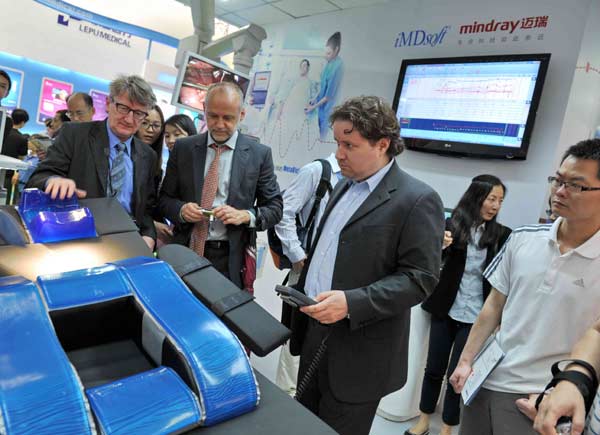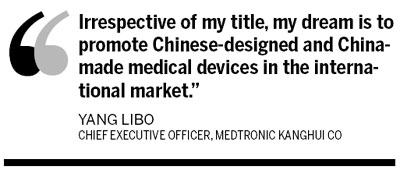Promoting Chinese medical devices
Updated: 2013-05-20 07:40
By Liu Jie in Beijing and Cecily Liu in London (China Daily)
|
||||||||
|
 International companies' representatives showing a strong interest in medical equipment made by Mindray Medical, a leading Chinese medical equipment producer, at a recent pharmaceutical fair in Beijing. A notable achievement for Mindray in the UK is successfully entering the procurement system of the country's national health service. [Photo/Provided to China Daily]
|
CEO's ambition to sell home-grown Kanghui equipment on world stage
Yang Libo worked in a medical device unit of Johnson & Johnson for four years before becoming chief executive officer in 2005 of privately owned China Kanghui Holdings, a leading Chinese orthopedics implants company.

Now his title is chief executive officer of Medtronic Kanghui Co, an independent unit of the multinational equipment provider, after his company was acquired by US-based Medtronic last October for $816 million.
"Irrespective of my title, my dream is to promote Chinese-designed and China-made medical devices in the international market," said Yang, adding that he believes the acquisition will be a crucial step in supporting Kanghui's entry into developed markets.
"We are proud of the company we've built and recognize there is a tremendous opportunity to accelerate our global vision by building on Medtronic's size, scale and expertise as part of this combined organization," he said.
After overseas study and work experience, Yang was hired by the founder of Kanghui, Jiang Yikang, in 2005 primarily to explore the original equipment manufacturing business. Three years later, Kanghui, based in Changzhou, Jiangsu, had become the original equipment manufacturer for three of the world's leading medical equipment companies, including US Paragon Medical Inc. In 2006, Yang successfully injected $10 million in venture capital from IDG Venture and Venture TDF Pte Ltd and received a second round of financing in 2008.
With the dream of internationalizing the brand of Kanghui, Yang and Jiang decided to export their products first to developing markets, such as the Middle East, Africa and Southeast Asia. Currently, its trauma, spine and surgical instruments are sold in 29 nations and regions around the world.
Listing in New York in August 2010 helped Kanghui raise $68.4 million. With sales exceeding 300 million yuan ($45.45 million) last year and double-digit annual growth, the Chinese company's gross profit margin has been above 70 percent and its net profit ratio exceeds 30 percent.
Despite the remarkable performance, Yang admitted that his dream has not been fully realized and access to developed markets is not easy.
"It's difficult to get our self-developed branded devices recognized in mature markets," said Yang, adding there were two reasons. One is that the mainstream medical industry - the professionals in high-end research institutes and top doctors in key hospitals - in the West have no access to knowledge of China-branded products and so do not buy them. Second, those that do know about Chinese products demand low prices, which squeezes the profits of Chinese companies. "Selling at very low prices may result in a funding crunch in research and development but high prices may lead to no orders," said Yang.
The deal with Medtronic is a way for Kanghui to have a presence in mature markets, establish its own brand and realize the true market value of its innovative products, said Guo Fanli, an analyst with China Investment Consulting Co.
After the acquisition, Kanghui is still independently operated by Yang and his team and Medtronic's engineers are to be introduced to jointly develop Kanghui and help it get access to global branding and sales. "We are to bring to Medtronic our local operating expertise, including our wide distribution network, strong local sales and marketing teams, local manufacturing and R&D," said Yang.
Kanghui's combined portfolio expands Medtronic's offerings in orthopedic surgery and complements the company's existing presence in spine, neurosurgery, neuromodulation, advanced energy and surgical navigation, according to Chris O'Connell, executive vice-president and president of Medtronic's Restorative Therapies Group.
Chinese and foreign companies' collaboration mainly aims at complementary product portfolios, market access, registration efficiency and distribution platforms, said Peter Hua, managing partner of Soft Bank China Venture Capital. "However, certification is also a hindrance for domestic companies to go global because local certification is very difficult to get in developed markets, especially Europe," he said.
Some powerful Chinese players are proactive, seeking to go out organically or via mergers and acquisitions.
Founded in Shenzhen in 1991, Mindray Medical established an office in the US in 2004 and did the same in the United Kingdom two years later. Its network of subsidiaries and representative offices has since been expanded into about 20 countries and regions, including France, Germany, the Netherlands and Spain.
A notable achievement for Mindray in the UK is successfully entering the procurement system of the country's national healthcare system, which is one of the most rigorous in the world.
Lepu Medical Technology spent $6.6 million purchasing a 70 percent share in ComEd, a Netherlands sales agency of medical devices used to treat cardiovascular diseases, at the end of 2011.
Beijing-based Lepu's devices are for coronary artery intervention and anesthesia delivery. ComEd is a middle-sized agency with annual sales of nearly 8 million euros ($10.39 million) in 2010. Its compound annual growth rate was 28.3 percent between 2005 and 2010.
"Lepu is eyeing the stable and fast growth of the agency and its rich resources in terms of administration and professionals, its sound relationship with many key hospitals and top doctors," said Hua, adding that in the medical device market, letting the practitioners, or people who use the devices, know about what is available is very important because they can influence the decision of purchasers.
Su Lei, an account manager at Mindray UK, said the UK medical market's lack of awareness of the company as a brand is a challenge it still faces.
"Our brand name is very well known by hospitals' procurement teams but far less known by doctors and nurses and the end-consumers," Su said. He explained that brand awareness is an important factor determining whether a medical equipment company can win a new contract because hospitals would only buy equipment from companies the doctors and nurses are happy to use.
'Doctors and nurses are actually very conservative people and they do not like to try new brands that they do not know," said Su. Western doctors have been using products made by Western brands such as Philips Healthcare and GE Healthcare for a long time so they know how they work, which makes it hard for new market entrants such as Mindray to break into them.
Paola Ramos, 27, who lives in London but is originally from Spain, said she does not know about any Chinese medical companies, including medical device producers, but will be happy to use them if they pass European Union standards.
Ramos used "good, accurate and effective" to describe her impression of Chinese medical products, although she has never tried one.
Mindray is focusing on building brand awareness in the West but considers it challenging. "Our competitors, such as Philips Healthcare and GE Healthcare, are divisions of conglomerates that sell many consumer goods so they are widely known," said Su.

 Michelle lays roses at site along Berlin Wall
Michelle lays roses at site along Berlin Wall
 Historic space lecture in Tiangong-1 commences
Historic space lecture in Tiangong-1 commences
 'Sopranos' Star James Gandolfini dead at 51
'Sopranos' Star James Gandolfini dead at 51
 UN: Number of refugees hits 18-year high
UN: Number of refugees hits 18-year high
 Slide: Jet exercises from aircraft carrier
Slide: Jet exercises from aircraft carrier
 Talks establish fishery hotline
Talks establish fishery hotline
 Foreign buyers eye Chinese drones
Foreign buyers eye Chinese drones
 UN chief hails China's peacekeepers
UN chief hails China's peacekeepers
Most Viewed
Editor's Picks

|

|

|

|

|

|
Today's Top News
Shenzhou X astronaut gives lecture today
US told to reassess duties on Chinese paper
Chinese seek greater share of satellite market
Russia rejects Obama's nuke cut proposal
US immigration bill sees Senate breakthrough
Brazilian cities revoke fare hikes
Moody's warns on China's local govt debt
Air quality in major cities drops in May
US Weekly

|

|







